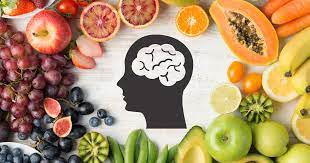The connection between what we eat and how we feel is stronger than most people realize. Emerging research reveals that nutrition plays a significant role in mental health, influencing mood, cognitive function, and even the risk of developing mental health disorders. In this article, we will explore the link between nutrition and mental health, highlight key nutrients for brain function, and offer practical strategies for better mental well-being through diet.
Why Nutrition Affects Mental Health
Food is not just fuel for the body; it also nourishes the brain. The brain is an energy-demanding organ, using up to 20% of the body’s energy resources. Just like any organ, it requires a constant supply of nutrients to function properly.
The Gut-Brain Connection
The gut-brain axis is a complex communication network that links the gastrointestinal system and the brain. Gut bacteria (microbiota) play a key role in regulating neurotransmitters like serotonin, which affects mood and behavior. A healthy gut can support a healthy mind.
Key Nutrients That Support Mental Health
1. Omega-3 Fatty Acids
- Found in: Fatty fish (salmon, mackerel), walnuts, flaxseeds
- Role: Reduce inflammation, support brain structure, and enhance neurotransmission
- Benefits: May reduce symptoms of depression and anxiety
2. B Vitamins (Especially B6, B12, and Folate)
- Found in: Leafy greens, eggs, legumes, meat
- Role: Involved in energy production and synthesis of neurotransmitters
- Benefits: Deficiencies linked to mood disorders and cognitive decline
3. Vitamin D
- Found in: Sunlight exposure, fortified dairy, fatty fish
- Role: Regulates mood and brain function
- Benefits: Low levels associated with depression and seasonal affective disorder (SAD)
4. Magnesium
- Found in: Nuts, seeds, whole grains, dark chocolate
- Role: Supports neurotransmitter regulation and stress response
- Benefits: Helps alleviate anxiety and improve sleep quality
5. Zinc and Iron
- Found in: Red meat, poultry, beans, fortified cereals
- Role: Essential for brain development and immune support
- Benefits: Low levels associated with ADHD, depression, and cognitive impairment
The Role of Diet in Mental Disorders
Depression and Nutrition
Several studies have found a correlation between poor dietary habits and a higher risk of depression. Diets high in processed foods, sugars, and unhealthy fats are linked to increased inflammation, which can negatively affect brain health.
Anxiety and Blood Sugar Balance
Erratic blood sugar levels can lead to mood swings and anxiety. A diet rich in refined carbs and sugars can cause blood sugar spikes and crashes, which may exacerbate anxiety symptoms.
ADHD and Diet
Children with ADHD may benefit from diets free of artificial additives and rich in omega-3 fatty acids, zinc, and iron. Proper nutrition supports attention, focus, and behavior management.
The Impact of Poor Nutrition on the Brain
| Poor Nutritional Habit | Mental Health Effect |
|---|---|
| Skipping meals | Mood swings, fatigue, irritability |
| High sugar intake | Increased anxiety, cognitive decline |
| Excess caffeine | Sleep disturbances, jitteriness |
| Low water intake | Difficulty concentrating, headaches |
Foods That Boost Mental Well-Being
Brain-Friendly Foods to Include
- Fatty fish – Provides omega-3s that support brain structure.
- Leafy greens – Packed with B vitamins and antioxidants.
- Whole grains – Supply steady glucose for brain energy.
- Berries – Rich in antioxidants that fight oxidative stress.
- Nuts and seeds – Contain magnesium, zinc, and healthy fats.
- Fermented foods – Like yogurt and kimchi to support gut health.
Foods to Limit
- Sugary snacks and drinks
- Fried and processed foods
- Artificial additives and preservatives
- Excessive caffeine and alcohol
Special Diets and Their Effects on Mental Health
Mediterranean Diet
Rich in fruits, vegetables, whole grains, lean proteins, and healthy fats, the Mediterranean diet is widely praised for both physical and mental health benefits. Studies show it can reduce the risk of depression and cognitive decline.
DASH Diet
Originally designed to lower blood pressure, the DASH diet is also associated with improved mood and lower anxiety levels due to its focus on whole foods and low sodium.
Plant-Based Diets
Diets centered around plant foods can be beneficial for mental health when well-balanced. However, they may require supplementation for nutrients like B12 and iron.
Practical Tips to Improve Mental Health Through Diet
1. Eat Regularly
Skipping meals can cause blood sugar crashes, leading to mood swings and irritability. Aim for three balanced meals and healthy snacks.
2. Prioritize Whole Foods
Choose unprocessed, natural foods that are rich in vitamins, minerals, and antioxidants.
3. Stay Hydrated
Even mild dehydration can impair concentration and mood. Aim for 6–8 glasses of water per day.
4. Limit Sugar and Refined Carbs
Reduce sugary foods that can lead to energy crashes and worsen symptoms of depression or anxiety.
5. Listen to Your Body
Cravings and mood changes can sometimes indicate nutritional deficiencies. Consult a healthcare provider if symptoms persist.
Conclusion
Nutrition and mental health are deeply intertwined. While food alone is not a cure for mental illness, a balanced diet can play a powerful role in managing symptoms, enhancing mood, and promoting overall brain function. Whether you’re struggling with stress, depression, or just want to improve your mental clarity, making informed dietary choices is a great place to start. A healthy mind begins with a healthy plate.
FAQs
1. Can what I eat really affect my mood?
Yes, several studies show that diet impacts brain chemistry, inflammation, and hormone regulation—all of which influence mood and mental well-being.
2. Which vitamin is most important for mental health?
Vitamin B12 and Vitamin D are among the most critical, as deficiencies are often linked to depression and cognitive issues.
3. Can poor diet lead to mental illness?
While a poor diet alone may not directly cause mental illness, it can increase the risk or worsen existing symptoms.
4. Are supplements necessary for mental health?
Supplements can help if you’re deficient in key nutrients, but it’s always better to get nutrients from whole foods when possible. Consult your doctor before starting any supplement.
5. What are some quick mental health-friendly snacks?
Try trail mix, yogurt with berries, avocado toast, or a banana with almond butter. These snacks provide healthy fats, protein, and antioxidants.





